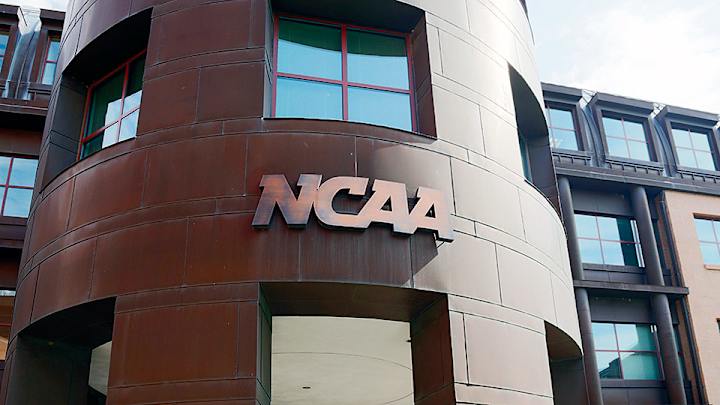NCAA satellite camp ban lifted, but deep-seated discord remains

There’s a new development in the storyline college football fans can’t wait to go away this off-season. The NCAA Board of Directors decided on Thursday to rescind the ban on satellite camps announced earlier this month. In a release, the NCAA said that the board wanted the governing body’s Division I Council to conduct a “broad assessment of the FBS recruiting environment.”
The upshot is that the ban is gone, but the NCAA is seeking a thorough examination of how recruiting can be improved. “The Board of Directors is interested in a holistic review of the football recruiting environment, and camps are a piece of that puzzle,” board chair and South Carolina president Harris Pastides said. “We share the Council’s interest in improving the camp environment, and we support the Council’s efforts to create a model that emphasizes the scholastic environment as an appropriate place for recruiting future student-athletes.”
The ban prohibited FBS schools from conducting camps for prospective recruits away from their campuses. It theoretically would have benefited the ACC and SEC—which previously had rules in place for their conference members barring such camps—by denying coaches from other Power 5 conferences access to their talent-rich territory (Michigan’s Jim Harbaugh ruffled feathers when he embarked on his seven-state “Summer Swarm” tour last year). But the ban represented a much more severe blow to Group of Five schools, which rely on the camps to unearth low-profile prospects.
Like myriad other pieces of NCAA legislation, the ban felt like yet another instance of multimillionaire officials and coaches getting their way at the expense of unpaid athletes. The mother of one five-star wide receiver in the class of 2017, Cass Technical (Mich.) High’s Donovan Peoples-Jones, had gone as far as to create a petition seeking to overturn the ban. Recruits were getting shafted, it seemed, because some schools didn’t want Harbaugh swaggering through their states with his shirt off handing out dozens of scholarship offers.
Yet at the time of the ban’s passing, it was difficult to foresee a seemingly petty, much-ado-about-nothing issue like satellite camps creating rippling effects this large in such a short span.
• ELLIS: 10 biggest things we learned from spring games
It started a few days after the ban was announced, when it became clear that some coaches did not fully comprehend what the heck just happened—namely, the degree to which the ban would impair the recruiting efforts of small-league schools. “I would love to continue that,” Ole Miss coach Hugh Freeze told Sports Illustrated’s Andy Staples. “I just don’t want satellite camps for the Power 5. I am for non-Power 5 schools being able to attend and evaluate.” Ohio State’s Urban Meyer took the same stance on the issue.
Unsurprisingly, Harbaugh spoke out against the ban, excoriating the NCAA in an interview with SI’s Michael Rosenberg. He suggested the term “student-athlete” be excised from the college sports lexicon and said the governing body’s incompetence had “reared its ugly head again.”
It soon became apparent, however, that the acrimony created by the ban would extend beyond a media shouting match among coaches. Pac-12 commissioner Larry Scott said at the College Football Playoff meeting in Dallas earlier this month that UCLA athletic director Dan Guerrero, who represents the conference on the NCAA council, erred by voting in favor of the ban. Eleven of the league’s schools (UCLA abstained) had opposed the ban. Scott effectively hung Guerrero out to dry in service of explaining his conference’s official position on a controversial topic (Guerrero defended his actions in a letter to Pac-12 athletic directors). Scott’s public censure of Guerrero should only create more tension in a league fighting to keep up financially with the Titanic Two leagues, the SEC and the Big Ten.
Meanwhile, a coach from one school that satellite camps would seem to help, Texas State’s Everett Withers, decried his league’s decision to vote in favor of the ban. “It was a snap decision. It was a bad decision,” he said, according to the San Marcos Record. Withers’s gripe with the Sun Belt is reasonable on the surface, but there was more to unpack here than one coach condemning a controversial new policy. Withers was denouncing his own athletic director, Larry Teis, who—like Guerrero for the Pac-12—served as the Sun Belt’s representative on the council.
A similar scenario unfolded in the Big 12, where Iowa State coach Matt Campbell said he was “furious” about the ban, according to the Ames Tribune, after Iowa State faculty athletics representative Tim Day voted in favor of it.
Step back to assess what has transpired since the ban was handed down, and it’s remarkable how the situation has evolved from “outcry over a rule that hurts recruits” to “alarming evidence of deep-seated dissension in major conferences” and “friction between coaches and their school's athletic officials.” Setting aside the plainly self-serving effort to bring satellite camps to a vote in the first place and the confusion over the scope of the ban, this saga revealed a troubling disconnect between athletic directors and coaches when it comes to making informed decisions about NCAA rules.
Thursday’s ruling will right a legislative wrong, so to speak, and prospects will be better off because of it. Harbaugh will have the green light to waltz across football fields in Alabama and Georgia populated by four- and five-stars, just as Arkansas’s Bret Bielema will be free to conduct camps in Big Ten country. Still, the most significant repercussions of the ban may not be fully understood for some time. What began as an inane debate about a recruiting tactic has grown into something that affects far more than coaches’ abilities to evaluate players in different parts of the country.

Chris Johnson writes about college football, college basketball, recruiting and the NBA.